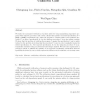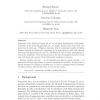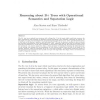127
click to vote
ICTAC
2010
Springer
15 years 1 days ago
2010
Springer
We consider software verification of imperative programs by theorem proving in higher-order separation logic. Of particular interest are the difficulties of encoding and reasoning ...
128
click to vote
JSC
2010
15 years 16 days ago
2010
We study the automated verification of pointer safety for heap-manipulating imperative programs with unknown procedure calls. Given a Hoare-style partial correctness specificati...
135
click to vote
ENTCS
2006
15 years 2 months ago
2006
Parkinson, Bornat, and Calcagno recently introduced a logic for partial correctness in which program variables are treated as resource, generalizing earlier work based on separati...
145
click to vote
ENTCS
2006
15 years 2 months ago
2006
Separation logic [20,21,14] began life as an extended formalisation of Burstall's treatment of list-mutating programs [8]. It rapidly became clear that there was more that it...
127
click to vote
ENTCS
2008
15 years 2 months ago
2008
We show how to reason, in the proof assistant Coq, about realistic programming languages using a combination of separation logic and heterogeneous multimodal logic. A heterogeneou...
115
click to vote
ENTCS
2008
15 years 2 months ago
2008
We formalize higher-order separation logic for a first-order imperative language with procedures and local variables in Isabelle/HOLCF. The assertion language is modeled in such a...
113
click to vote
ENTCS
2008
15 years 2 months ago
2008
As an extension to Floyd-Hoare logic, separation logic has been used to facilitate reasoning about imperative programs manipulating shared mutable data structures. Recently, it ha...
109
click to vote
ENTCS
2008
15 years 2 months ago
2008
This paper explores a unification of the ideas of Concurrent Separation Logic with those of Communicating Sequential Processes. It extends separation logic by an operator for sepa...
138
click to vote
ENTCS
2008
15 years 2 months ago
2008
The B+ tree is an ordered tree structure with a fringe list. It is the most widely used data structure for data organisation and searching in database systems specifically, and, p...
126
click to vote
FORTE
2010
15 years 3 months ago
2010
Abstract. Separation logic is a popular specification language for imperative programs where the heap can only be mentioned through pointsto assertions. However, separation logic&#...



